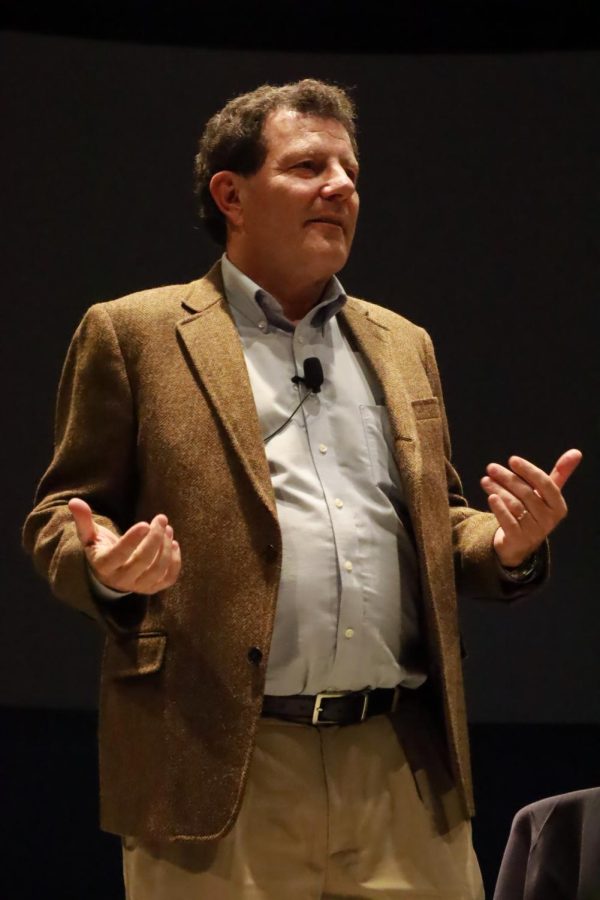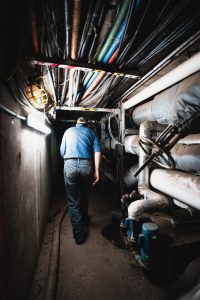- Beavers Digest
- Beavers Digest / Culture
- Beavers Digest / Culture / People
- Beavers Digest / Entertainment
- Beavers Digest / Entertainment / Events
“How can we fix the problems all around us?” Recap from this year’s Governor Tom McCall Memorial Lecture with Nicholas Kristof
Rafael Quero Juarez, OMN Photographer
Nicholas Kristof, keynote speaker, speaks at the Tom McCall Memorial Lecture on April 24 in Learning Innovation
May 22, 2023
“We need intellectual curiosity about Americans who have very different viewpoints than us,” Nicholas Kristof said during his keynote speech for the 2023 Tom McCall Memorial lecture on homelessness, poverty and the urban-rural divide, on Monday, April 24.
Kristof is a two-time Pulitzer Prize winner, political commentator, CNN contributor, New York Times columnist and author of two books.
His speech covered issues he discussed in his book, “Tightrope: Americans Reaching for Hope,” which he co-authored with his wife, Sheryl WuDunn. The book was an examination of their travels to stagnating communities across the country. The book highlights the crisis in rural working-class America and the growing challenges facing rural communities, with an emphasis on Yamhill County, Ore., the town where Kristof was raised and currently resides.
As a global journalist, Kristof has spent time reporting on poverty in Somalia, Sudan, eastern Congo and Darfur, to name a few. He said when covering poverty in these places, there was a clear language to describe the problems, such as famine, malnutrition and child fatality rates.
Coming back to the U.S., he found there is no cohesive language for poverty. Income and wealth don’t say enough, he said. It is “a tangle of pathologies,” such as the loss of a sense of purpose, loneliness and lack of belonging.
“I came back from a humanitarian crisis abroad to find a humanitarian crisis at home,” Kristof said. “Every three weeks we lose more Americans from suicide, drug abuse or alcohol than we did in 20 years in Afghanistan and Iraq – we called these deaths of despair,” said Kristof.
He talked about a family of five kids he rode the bus with to school every day. Over the years, he has come to find out that each child died in a tragedy. One died in a meth lab, one passed out from alcohol and died in a house fire, and the others died in equally tragic ways. When he visits home, he now sees their mother walking up the hill to bring flowers to each of her children’s graves.
Witnessing the people he grew up with facing ongoing tragedies was part of what called him to write this book and try to raise more awareness of poverty, education and the issues facing rural America.
When it comes to homelessness in the U.S., Kristof talked about how Measure 110, passed in Oregon in 2020, was faulty in only decriminalizing drugs without creating strong and accessible treatment plans.
In Portugal, where a similar measure was passed, the decriminalizing aspect was done in order to build trust between treatment workers and those with addictions. Their main plan was a public health initiative to create overt, widespread, accessible treatment, Kristof said.
However, Oregon just decriminalized drugs without the treatment aspect, and now the drug crisis has worsened, Kristof explained.
Regarding education, Kristof expressed his worry about where Oregon will be 25 years from now. Education is a great indicator of our future success, and right now Oregon is ranking almost the lowest in the nation on many benchmarks, said Kristof.
He recently visited Mississippi to learn about how the reading and literacy scores are so high and emphasized the importance of getting kids through high school graduation.
In other places he has visited, he has seen a much higher dedication to getting each individual student through school. “It can be done,” Kristof said.
Growing up in the small town of Yamhill gave him some personal insight into the urban-rural divide.
He talked about how so many rural areas around the country are struggling greatly. In Oregon specifically, there was a lack of empathy involved when we shut down much of the timber and logging industry, leaving many of those towns in despair.
Kristof sees renewable energy, especially in Oregon, as a way forward for bringing jobs back to rural areas and connecting urban and rural communities. “There is great potential,” said Kristof.
On the issue of gun rights and having civil conversations between conservatives and liberals, he emphasized the importance of breaking down an issue into its simplest form. He recommended not to say the words “gun control” and to instead talk about the fact that maybe Oregon should raise the gun purchasing age to 21 just as Wyoming, a proud gun-rights state, did.
Kristof left the audience with an anecdote about how “we won the lottery of birth.” Although this country has many issues facing us, we can still recognize the position of wealth and privilege we all have as citizens of this country.
“How can we repay the debt and pay it forward to those who have been left behind?” Kristof asked.






